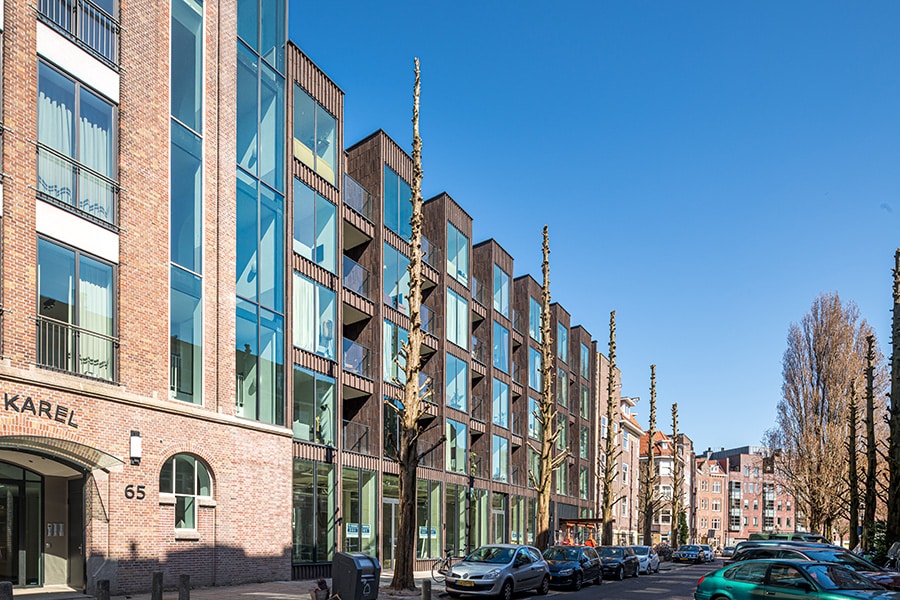
5 reasons why every construction company should commit to digitization
Digital transformation has been high on the agenda in every sector for several years. While some are now well advanced, others are proving to be less than perfect. The latter is certainly true for the construction industry. However, a data-driven approach offers construction companies great added value. Not only to complete projects faster, but also to save costs and do more work with the same amount of hands.
A look back over the past two decades reveals that the construction industry has remained stagnant in many areas during those two decades. Year after year, the industry recorded only 1% productivity growth. Projects that fail are often due to improper project management and poor communication. Meanwhile, construction companies face the impact of labor shortages, the high cost of building materials and the fact that clients are struggling with a lack of capital capacity to build.
These are all problems that innovative, data-driven technology can help with. According to a survey by FM Consulting, most organizations are doing just that. Over the past three years, for example, the volume of data has doubled. While 40% of those surveyed say they are analyzing and quality-engineering their data at regular intervals, only a small minority manage to leverage the data in their daily activities. Thus, with no return on investment, this means that all these investments are lost in a kind of pseudo-digitalization.
Move faster with a construction-specific cloud platform
So what are the main obstacles for companies to make the most of their data? Most organizations struggle with lack of time and the urgency of the decisions they need to make. And when construction companies claim that they are already fully digitized, it turns out that they have done so mainly at the divisional level. Indeed, by digitizing individual departments, you can ensure that everyone within a single team is rowing in the same direction. If all entities continue to work side by side, it still does not advance the company as a whole. Digitization should therefore have the ultimate goal of allowing data to flow as one flow throughout the entire organization.
Digital collaboration will only become more important in the coming years. Of course, it is not easy to combine data from different sources. Where cloud provided a breakthrough in the past, we now see industry-specific cloud platforms emerging that bring together different applications in the engineering and construction cycle. Often this is still a platform with grouped but admittedly individual (not connected) applications. The most innovative platforms provide a full end-to-end experience. They create added value by connecting all processes, data and users together in one flow without duplicate input work.
So digitization offers nothing but benefits for construction companies. Below we give five reasons in advance why it should absolutely be given top priority:
1. Construction companies can respond smarter to labor shortages
The labor market has been under pressure for some time. In the construction sector, for example, there is currently a shortage of about 20,000 workers. And that figure is still fairly optimistic, since it only takes into account the outflow of current employees and thus does not look at growth potential. Digitalization increases efficiency, making project delivery smoother. As a result, the existing workforce is used optimally and shortages can be better addressed.
2. Fewer errors and higher margins
Thanks to a digital approach, projects can be handled much more systematically. In practice, a construction company makes an average of up to 30% mistakes on a project. Most failures are the result of processes that are misaligned and teams that fail to communicate properly. Using a data model, these errors are perfectly avoidable. A quick calculation reveals the impact this will have on your construction company's revenue.
3. With the right approach, building becomes more affordable again
Uncertainty and inflation have created a serious barrier to start building. Not surprisingly, some 35% fewer residential loans were applied for in the first quarter of 2023. Since digitization allows a project to be delivered more efficiently, this also presents opportunities to make the price more attractive again for people who want to take the plunge. For example, if you know that the cost of insulation material is skyrocketing, you would prefer to waste as little of that material as possible due to mistakes. Companies that are thanks to BIM succeed in, need less commission and can offer a more affordable project.
4. Sustainability becomes an asset rather than an inhibiting factor
Construction projects are often delayed because environmental permits must be applied for. If you can draw up a digital twin not only of the building but also of the construction process in advance, provinces and local authorities immediately have all the information they need to make transparent decisions. Adjustments prior to the permit are then much easier. With sustainability in mind, more and more reports and certificates must also be submitted. By making maximum use of BIM building models throughout the construction cycle, we obtain insights about the identity of the materials (passport), the CO2 emissions of a construction or the nitrogen emissions on a construction site in one go. This in turn also immediately enriches the as-built file.
5. Digital collaboration increases security
Finally, digitization also contributes to a safer workplace. Dashboards, for example, can provide a clear overview of all incidents and problems on site. It gets even better when you can use information to engage in prevention. A simple example: thanks to an end-to-end platform and streamlined processes, you could conclusively prevent two crews from operating on the job site at the same time. After all, if one team is working on the floor on the second floor, you don't want another crew to start working on the ceiling on the floor below. These are things that happen too often today.
In short, thoughtful and strategically driven digitization is a must for any construction company that wants to remain relevant in the future and respond wisely to the challenges and expectations of our modern society.



